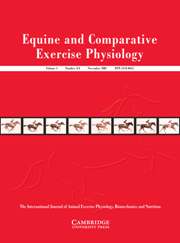Article contents
The influence of adrenaline on echocardiographic parameters of left ventricular function in the horse
Published online by Cambridge University Press: 09 March 2007
Abstract
The purpose of the present study was to investigate the effect of adrenaline on cardiac function parameters. The infusion of adrenaline for induction of stress, its prospective side-effects as well as its effect on left ventricular function were investigated. A clinical examination and echocardiography were performed on 10 healthy horses before and after infusion of adrenaline. During a period of 6 min, infusion of 1 μg adrenaline kg−1 min−1 led to a significant increase in mean heart rate, from 36.5 to 55 beats min−1. Echocardiography during adrenaline infusion revealed a significant thickening of the interventricular septum (during systole) as well as a significant decrease in left ventricular diameter at the papillary muscle level (during both systole and diastole), and thus an increased contractility. The left ventricular area and the left ventricular volume were significantly decreased during adrenaline infusion, expressing the increased left ventricular contractility (during both systole and diastole). Other echocardiographic parameters of regional left ventricular function changed with only low-grade significance or without any significance at all. During and after infusion of adrenaline, the horses showed sweating, muscle tremor and other symptoms of discomfort. The study revealed that the increases in heart rate and myocardial contractility after infusion of adrenaline were low compared with changes observed during physical performance. Furthermore, severe adverse effects were observed. Taking into account the possible cardiotoxic effects of adrenaline, we do not consider this method appropriate for stress induction, particularly in horses with cardiac disorders.
- Type
- Research Article
- Information
- Copyright
- Copyright © Cambridge University Press 2005
References
- 2
- Cited by


